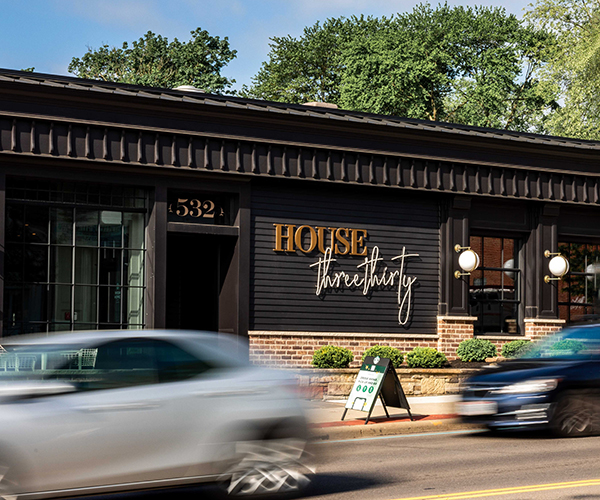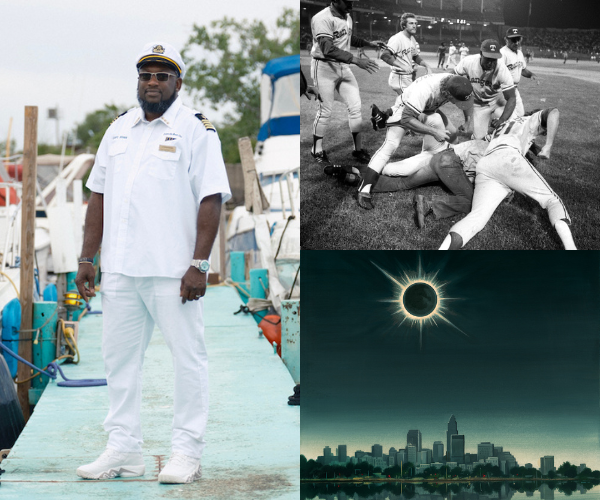Charles Taylor lives, comfortably retired, in a mansion in Calabar, a beautiful Nigerian city near the ocean. He left his old job, president of Liberia, last August, as rebels surged toward the capital and U.S. warships hovered on the coast. He's had trouble letting go; the United Nations Security Council and his host, Nigeria's president, have told him to stop calling Liberian officials on his cell phone, afraid his voice on the line could destroy the ravaged country's fragile peace.
Some estimate Taylor's personal fortune at up to $100 million, most of it allegedly stolen from Liberia's treasury and seized from Sierra Leone's diamond trade. If his conscience bothers him about that or the war he helped start to get the diamonds — which left hundreds of thousands of civilians murdered, raped and mutilated — he doesn't show any sign.
Sarah Blake, Matthew Ross and Leslie Murray, law students in Cleveland, spent this fall reading about Taylor and Sierra Leone for angry inspiration as they labored day and night at Case Western Reserve University's law library, digging up details of international law, trying to help convict Taylor of war crimes.
"When I was doing my research, I read the articles of these horrible, horrible things that these people have gone through," Blake says. "And this man wants to claim that because he was a head of state, he should be able to get away with it?"
The students sit outside the University Circle Arabica to relax and talk about the memos they've just sent to Africa. It's early November, and Blake wears a blue fleece jacket to fight the fall chill as she describes their project with the crisp coolness law professors expect. Ross, an excited yet meticulous talker, sets down his bulging black bag that seems to hold all of the law school's heavy weight. Murray mixes enthusiasm with careful precision as she talks about their project.
Every semester at Case, students like these three help to prosecute foreign generals, rebel leaders and government officials for crimes against humanity. They're researching the powers and limits of international law for prosecutors investigating the civil war in Sierra Leone, the wars in the former Yugoslavia and the genocide in Rwanda. It's their final project in Case's war-crimes research lab, an 18-student law class taught each semester.
"Students want to do real-world work while in law school," says professor Michael Scharf. The lab, which Scharf co-teaches, gives them the chance to do that — and, maybe, help make history. "For the next 50 years, they'll be talking about how they played a role in this," Scharf says.
Lawyers at the U.N. courts rely on the students' work because the courts struggle with meager budgets and thin law libraries. Scharf saw proof when he visited the Rwanda tribunal in Tanzania, near Mt. Kilimanjaro. "There was a room half full of the notebooks [with Case students' legal arguments] we've sent so far," he says. "There were notebooks on people's desks."
Some students go on to intern at the courts. This fall, one even helped judges with the case against former Yugoslav president Slobodan Milosevic.
"It definitely helps them in the job market, whether or not they're seeking out jobs in the international field," notes Scharf, a former U.S. State Department lawyer who brought the lab with him from the New England School of Law in 2002. "What could be more interesting than saying, 'I helped prosecute Milosevic or Charles Taylor'? That sets the interview off on a really good note."
Last winter, when Taylor was still defying his enemies from Liberia's presidential mansion, blustering through news interviews and vowing to stay in power, a call came from West Africa to Cleveland. The prosecutors at the Special Court for Sierra Leone told Scharf that they wanted to reach across borders, past diplomatic immunity, and indict Taylor for his support of Sierra Leone's notorious Revolutionary United Front.
RUF guerrillas, who fought a 10-year war against Sierra Leone's government, murdered civilians, kidnapped them, forced them to mine diamonds, made them sex slaves, hacked off their hands and feet and carved the initials "RUF" into their skin. Taylor is accused of funding and training the RUF to gain control over Sierra Leone's diamond mines and plotting the war with RUF leaders Foday Sankoh and Sam "Mosquito" Bockarie, whose nickname derives from his blood-sucking reputation.
Taylor not only helped destroy Sierra Leone, he wrecked Liberia, too. He plundered its treasury as a government official, fled to the United States, escaped from a Massachusetts prison to avoid extradition, then went back to Africa and spent years leading a civil war. He won election as Liberia's president by threatening the voters that he'd start another war if he lost.
Yet Taylor had a lot of ways to elude trial. As president, diplomatic immunity protected him from arrest. He could argue that the court has no power over him because he's Liberian and wasn't even in Sierra Leone when atrocities were committed.
Now, as the prosecutors prepared their indictment, they asked Case to research arguments for defending it in court. Scharf gave some of their questions to Diego Archer and Andres Perez, two law students who were born in Latin America. Archer grew up in El Salvador during its brutal civil war and, as a clerk with his country's supreme court, interviewed victims and witnesses of military and rebel atrocities. When Perez was 11 or 12, he heard gunfire and saw tanks and dead bodies in the streets after riots in his native Venezuela.
Their experiences got them interested in international human-rights law. "I always wanted to devote myself to making a difference, getting things fixed," says Perez.
Both students wrote memos arguing that international law can punish Taylor for funding the war in Sierra Leone. Archer points to an emerging trend that holds world leaders accountable for crimes in office: Milosevic's war-crimes trial, former Panamanian dictator Manuel Noriega's drug-trafficking conviction in a U.S. court, and a Spanish judge's groundbreaking attempt to try former Chilean dictator Augusto Pinochet for human-rights violations.
"The idea is that Charles Taylor, by becoming involved in this conflict, aided and abetted in committing really heinous atrocities related to war," explains Perez. "That overlapped into things bad enough for universal jurisdiction" — the controversial idea that any court can punish crimes against humanity.
The court secretly indicted Taylor in March 2003. Archer and Perez sent their memos in April. The prosecutors revealed the charges in June, when Taylor went to Ghana for talks with Liberian rebels and promised to resign as part of a peace deal. The prosecutors hoped Ghana would arrest Taylor, but he fled back to Liberia before his hosts could decide what to do.
All summer, the world waited to see if Taylor would keep his promise. Finally, in August, he accepted Nigeria's offer of asylum, claimed in a final speech that history would absolve him, then resigned and flew into exile. He moved his entourage into a home loaned by Nigeria's president. He hired a lawyer in Sierra Leone, who tried to get the war-crimes charges dismissed.
That's when Sarah Blake, Matthew Ross and Leslie Murray got involved.
"I picked who I perceived to be my strongest students for the Sierra Leone tribunal [cases]," says Scharf. The students had to help the prosecutors solve several tough problems.
Blake, like Perez and Archer, had to show why diplomatic immunity doesn't apply to the international court. She spent almost all of September and October working on her memo, skipping some of her other classes.
Ross looked into a long-shot argument: whether Taylor was submitting to the court's jurisdiction by having his lawyer show up.
"I pretty much lived out of the library. I would duck out for food, a shower, class," Ross says. He read articles about the atrocities in Sierra Leone to get psyched up about hitting the law books again.
Even if the judges let the case go forward, the court still had to get its hands on Taylor. So Murray looked for arguments that could convince Nigeria to turn Taylor over even though it had granted him asylum.
A courier rushed their memos to Freetown, Sierra Leone, in late October, just in time to help the prosecutors write their briefs.
The Case memos were "very, very apt, very precise and to the point," says Abdul Tejancole, one of the prosecutors. He remembers working late to add the ideas of one Case memo, probably Blake's, to a brief just before the court's deadline. Murray's memo helped with diplomatic statements the prosecutor made, trying to get Nigeria to surrender Taylor. "It was the first thing we consulted," Tejancole says.
In early March, as Taylor quieted down and sunned himself in Calabar, the students waited for word from Sierra Leone and toiled through another semester, not sure if the tribunal would dismiss Taylor's case or let it proceed.
"I definitely think [Taylor] should have to stand trial for what he did," Blake says. She'd like to think her work strengthened the prosecutors' arguments. "You really do get a feeling that maybe I am making some difference, even if it's a small one."
If Taylor stands trial, the precedent could become a weapon of justice against future world leaders who commit war crimes. Ross says he still can't believe he worked on such an important case. "I'm always shocked I was able to make such a contribution, [that] the United Nations ... court is entrusting international-law students with this awesome responsibility of helping prosecute a war criminal."
Working on the Taylor case inspired Murray to apply for an internship with the Sierra Leone court for this summer. Someday, she says, she'd like to work on transnational torts, cases like the lawsuit against Libya for the 1988 Pan Am Flight 107 Lockerbie bombing.
But frustration seeps into Murray's voice as she talks about her memo. Since she wrote it, Nigeria's president has said he won't surrender Taylor to Sierra Leone. Secretary of State Colin Powell recently told a congressional panel that the U.S. government wants Taylor tried someday, but it will respect Nigeria's asylum deal "for the moment."
"I think eventually Nigeria will get fed up with [Taylor's] antics," Murray says. But she's disappointed that her country isn't pressing harder for justice. "If the U.S. pressured Nigeria at all to extradite him to the court, they would," she says.



